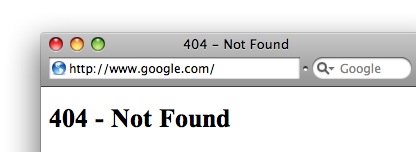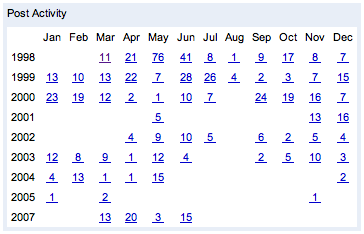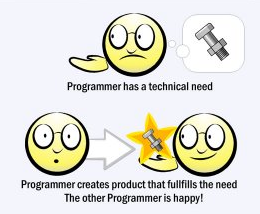Learn math
There’s a brief comment on his FAQ page which jumped out at me: “[...] I also try to watch very little television”. Bingo. Life’s too short to watch television. This guy shows just how much people can accomplish when they put their mind to it.
Incredible.
When asked about his religion, Salman Khan replied with this...
Wow again.If you believe in trying to make the best of the finite number of years we have on this planet (while not making it any worse for anyone else), think that pride and self-righteousness are the cause of most conflict and negativity, and are humbled by the vastness and mystery of the Universe, then I'm the same religion as you.
Another dominant player
I kind of liked TUAW’s graphic - enough to add a reduced copy right here:

The blogosphere can be pretty boring at times.
This is such a time. All the same stories, endlessly
reverberating.
Now if you’ll excuse me, I’m going back to tinkering
in Jee Labs - so much more fun!
Monopoly
Cognitive surplus
I no longer go watch TV. That trend started many years ago. Oh sure, I do watch movies, documentaries, and interviews (not news - all the Dutch news channels seem to be aimed at infants). But it’s been ages since I sat down to do nothing, waiting to be distracted or entertained. I’m grateful that Shirky finally explains how “the media” - as they are today - are essentially an aberration.
It also explains why open source communities have a virtually unlimited amount of time, energy, and talent at their disposal.
Reality sinks in...
When natural disaster strikes, we act, immediately.
When man-made ones are being created... we don’t?
One day, I will look back on my life and feel infinite shame and guilt.
To know and to ignore. To postpone compassion - indefinitely.
Burying myself in helplessness - can’t change things anyway, right?
Right. Yet so wrong.
Getting things done
Great interview (audio) + fantastic presentation (video) about why finishing is so hard.
I don't tweet
Not doing what everyone else does matters. In times of war, and in times of luxury.
Debilitating complexity
Goodbye Google
Is that a new whiff of fresh air I sense? Oh, no, wait... it started snowing here :)
Attention
But things seem to have changed this year. I’m starting to get better at giving attention. To people (mostly face to face), but also to my work (by making choices).
Attention, competence, respect - my keywords for 2020.
Goodbye Twitter
It was a good way to find out what they are all about. And now I know. It’s about nothing. Noise. Distractions. Following. Being “friends”. On a scale not fit for normal human beings, IMO. And depressingly uninteresting. I’d rather watch TED, listen to Radio Lab, or sit back with an episode of Life, thank you.
So goodbye Twitter, Facebook, LinkedIn, and the rest of these social networking sites. I’m outta there. Life’s too short.
The other thing I want to drop out of is Google. Still got some groups and code there, so that will take more work. Dear Google, please stay around forever to help me find stuff. You’re providing an incredible public service. But for everything else, stay away from me. I don’t want your cookies, no matter how sweet you try to make ‘em.
Where are you?
Could it be that phone companies don’t want to draw attention to the fact that they are collecting obscene amounts of (SIM-ID, location, time) data? How come that topic never makes it to the headlines, other than when an alpinist gets saved because their cell phone was sending out its beacon signal? Does Google know when there is a flu outbreak? You bet. Does the phone company know when there is a traffic jam? You bet. Are there services we could be having cheaply or for free which aren’t being offered because there are other interests than the customer’s at stake? You bet. Are there things going on with all this data which we would object to if only we knew about them? You bet.
I’ll stop here. I’ll spare you a rant on the amounts of information obtained from all those satellites around our little planet :)
High school with a modem
Maths
It’s good to think back about maths once in a while, even though the field of computing has hijacked my mind and ambitions for many decades now. The paper introduced in this article about maths is a stunning reminder of what mathematics is really about. Beauty. The power of ideas. A fantastic introduction for anyone interested in finding out what real mathematics is.
I recommend reading the first 10 pages of that 25-page document. Much of the rest is about maths education. The author is clearly on a rant - but all the way to the end his arguments expose the infinite beauty of mathematics in all its simplicity.
Update - there are very strange alleys in that labyrinth called “mathematics”. Such as this example from a recent discussion:
All elements of the empty set
are floats.
All elements of the empty set are
ints.
Ints are not floats.
Therefore all elements of the empty
set are not floats.
It leads to areas such as meta-mathematics and my all time favorite: Gödel’s incompleteness theorem. Fascinating, but mind-bending. At times painfully so. If you’re more interested in (near-tangible) beauty, stick to Lockhart’s article above.
Two types of work
I’m squarely a type one person by now.
One of my last clients called me / us “cowboys”. We completed the project on time, on budget, and on spec even though it was clearly a panic-mode project by the time we got involved, but I turned down a follow-up proposal. Because they were clearly in the type two camp. From a business standpoint, they were probably right, but I sure would have loved to tackle that challenge with a clean sheet of paper.
Soît.
Anomaly
Kenya
Kofi Annan and Barack Obama - I am extremely impressed by what Africa has to offer.
Meta-productivity
It’ll be very interesting to see how the 43f website evolves, given this new insight.
Life ≠ prices
Just spent a few days in Berlin. Lots of glitz, history, art, and architecture, of course. I was deeply shaken by the memorial - not in the least because IMO it could all happen again, to anyone, anywhere, anytime. It’s encouraging to experience such a well-balanced statement, specifically in the re-united Berlin and in this day and age.
The reason I mention Berlin is that a few days of wandering around made me realize that life as a tourist would be a lot more fun if not every single sip, bite, and step were tagged with a price, i.e. lots of stupid distractions.
Speaking of which ... next week we’ll be strolling in Paris, my home town when I was 7 and 8. It’ll be all about delight.
Green consumerism
What I don’t see, is information about the level of energy / raw material waste required for the production of goods. It’ a bit like adding insult to injury: first we become responsible for a hugely wasteful production and transportation process by buying some flashy new X, and then we become doubly wasteful by discarding the product well before it has ceased being useful.
I just don’t get it. We drive a Volkswagen Golf which is definitely not the best in terms of gasoline economy, but I wouldn’t dream of getting rid of it after 7 years of fantastic, enjoyable service. It’s fast, it’s gorgeous, it’s luxurious. Yet I think we qualify as having a respectably low “carbon footprint” - to use that phrase-du-jour. How? By driving less. How about technology in the house, then? That too: we turn stuff off. Genius, eh?
There used to be such great solutions ages ago. Such as power-cords which can be unplugged, and switches embedded in the power cord, before the power bricks. Remotes to control stuff are wonderful. But to turn stuff on and off? C’mon, get a life. Or better yet - get up and, ehm ... walk?
I can’t stop recommending this 11-minute TED presentation by Chris Jordan.
And to get back to computers: if you’re looking for an always-on server, have a look at Bubba. It’s a full Linux setup, with all the extensibility of Debian built in, right out of the box (the manual includes info on how to get SSH access, it’s not some hidden-on-reflash feature). I’m using a similar, but less streamlined, setup based on an NSLU2, and it does SVN, iTunes music, even handles Time Machine backups. On roughly a kilowatt per week.
Oh, and remind me to also rant about noise levels, one day :)
Identity
Group buy
Good movie
I have a boundless respect for movies which address major issues without pointing the finger or talking in primitive “us vs. them” terms, as epitomized by the “you’re either with us or against us” phrase. On the human level, every attempt to define “us” and “them” ends up being shallow - there is only me and you. Life is not about labeling opponents, adversaries, enemies, or terrorists, but about building bridges and crossing them - one person at a time, if need be. Brothers (the movie) is an illustration of that.
Ok, now you can go back to doing whatever nerdy stuff you were doing ;)
TED at its very best
Design
Design is what has made me tick for the past decades, and will do so for decades more to come, I hope. Design has no age limits. Design is about the why, the who, and the how - asking "why" things work the way they do, "who" figured it out, and "how" they did it. Design is about beauty, of course. But design is also about social structures, when trying to understand what floats to the top of a group, a community, or a society. And design is about power and politics, when you think about which designs succeed in changing the world we live in.
Design is a lot about creativity, obviously. Design is where mind meets substance. Design is where emotions and rationality dance with each other. Like quantum physics, design is about entanglement. You can't just sit and dream, waiting for the right design to come to you. Nor slave your way through to a good design. Design is about tension, and about balance. And design doesn't fit a 9-to-5 schedule (me neither, so now I have an excuse!).
But above all, design is about the future. Those of us involved in design, are those who want to shape that future - literally of course, but also figuratively. Designers look forward. Designers want to make this world a better world. Not by forcefully changing directions of what is happening now, but by looking beyond today's horizons and describing the places we could be in tomorrow. Design is not a methodology of "push", but one of "pull".
People (and things) are the way they are today, often for overwhelmingly valid and explicable reasons. Bodies (in both senses) in motion have a way of continuing on their previously chosen paths. Design is not about today's path, but about tomorrow's choices.
FYI, I'm writing this as a reminder to myself that I should be less concerned with what is happening today and more focused on what can be tomorrow. And because it gives me the opportunity to mention that I'm immensely proud of our daughter Myra, who wants to be... a designer. I can't think of many things more fulfilling, both for her and for us, than to want to actively be part of our respective futures - and to contribute to shaping it.
Reality
Well, I don't care. The professional world we live in is so detached from the human condition by now, that I need to draw a line. Not a day goes by where I don't think about world events and the personal tragedy associated with them. The buck stops here. I no longer want to blog about "fun stuff" without exposing that other side of me.
The article that led to all this is an interview with Robert Fisk. Which made me realize that today, wars are waged by proxy - the actors are a bunch of young kids we don't know, and the witnesses tell stories we hear little about. Soldiers and reporters (oh, and some collateral damage). With our televisions and computers as the ultimate proxy.
I try to imagine the reality on the ground in a conflict zone such as the middle-east, from any perspective. And I can't really. Imagine growing up or growing old in such a context. Day to day, for years on end. The mind boggles. When I merely broke my leg a few months back, an immense safety net of family, friends, medical care, compassion, personal attention, and empathy unfolded itself. Then, in accurate lock-step with my recovery, that same safety net retreated, going on standby again just as automatically. Life is darn good here, not according to some metric, but because of the knowledge that no matter what happens, life will still eventually work out ok. It's hard to imagine two situations further apart than life over here and life over there. The horror being that much of this is due to armed, man-made, conflict. Why, with all our culture and technology, are we as a whole still living in medieval times?
The injustice on this planet is obscene.
Refutation
Imagine taking this one step further and turning it into a mechanism to improve blog / wiki / forum discussions: people can tag/vote on each comment to qualify it as one of the DH1..DH6 categories. A rule could be that each person gets associated with say the average voting result, and that a person cannot tag any other comment above his/her own "level" (or perhaps a single step above). The reasoning being that only people considered able to argue on a high level would be allowed to tag other comments as being on a similar level.
With such a system, one could then cut-off low-class entries when going through a lengthy discussion thread. Quoting one of the last paragraphs in the article:
I think it would make discussions far more interesting, particularly controversial ones...But the greatest benefit of disagreeing well is not just that it will make conversations better, but that it will make the people who have them happier. If you study conversations, you find there is a lot more meanness down in DH1 than up in DH6. You don't have to be mean when you have a real point to make. In fact, you don't want to. If you have something real to say, being mean just gets in the way
How we make decisions
Site changes
Personal details
Trouble is - all that data just keeps on getting collected. The big problem is that it's not just about what people do with that data today, but what someone might decide to do with it in the future. Where is all that data going? How come it's getting into all those laptops and CDs in the first place?
There is no need to delete anything, now that storage is so cheap (except perhaps in the White House, or while circumventing it?).
We're setting ourselves up to pay dearly one day...
Stay hungry
Unfortunately for me, this does not imply the inverse: spending 10 years on something does not guarantee that anything even remotely useful comes out ... but still, if this is true it's quite an amazing example of focus and perseverance!“Do you guys know Fermat’s Last Theorem?”
[...]“Everyone here knows that is it is Prof. Andrew Wiles who spent about 10 years to prove it. The final proof from him came in publication in 1994”
“It is correct. However, do you guys know how Prof. Andrew Wiles found these 10 years to dedicate himself to the Great Fermat theorem?”, he signed, “Prof. Andrew Wiles told me by himself, in order to focus on the proof of the Fermat’s Last Theorem, there was one year in which he worked extremely hard to write 20 papers and locked them up in his desk drawer. Then he would pick up two to publish each year. In this way, he gained precious ten years to allow himself to do nothing else except Fermat’s Last Theorem”
Images
Last year, it was an incredible journey through India by Danielle & Olivier Föllmi (ISBN 9782732431079). This year it is the sequel to "La Terre vu du Ciel" by Yann Arthus-Bertrand (ISBN 9782732436661). The publisher's site prevents deep-linking, unfortunately.
For images and prints from these and several other photographers see this site.
For me, it is a truly incredible way to start each day...
year = year + 1
Here is my personal list of favorite films, in case you're interested.
Winter

The whole place looks like a beautiful sugar-coated village out of a fairy tale!
Dependency

Is that the modern rendering of the phrase "when hell freezes over"?
Junk filter

The purple entries were automatically marked as spam and hence ignored. It's both encouraging and depressing - depending on how one looks at this...
Next gadget
On the plus side, energy consumption of the tech stuff that's always on here is now under 25 watts per hour (adsl/wlan box, nslu2 server with 2.5" hd, mac mini in sleep mode). Plus the fridge, of course.
Do the two balance out? Not by a long shot. Maybe I can do better in 2020.
Our world
Valid
Opportunities
I can only conclude that this all happening and anyone with broadband access being able to find out about it illustrates how the internet is enabling a new renaissance. What an extraordinary times we live in. And what an opportunities for improving our world!
(Having broken a leg last weekend - silly me - I'm being forced to work at a slower pace the coming weeks. Then again, probably wouldn't have gone through the above presentations otherwise - so there seems to be a silver lining to everything, as they say...)
UPDATE: Dan Gilbert's presentation (#6) is really incredible, IMO.
Finished
Anyway, today was the deadline for a very tight schedule, and we made it with a result I'm really proud of. On time, on specs, and on budget. So now I'm celebrating... cheers!
Real content
Away
Privacy?

That's instant access to almost a decade of tracking what and where I posted on Usenet and Google groups. Not to mention every search over the past 18..24 months,and my ISP being required by law to remember every IP address I've contacted in the past 6 months. It's a small step to permanent storage.
Imagine another Joseph McCarthy: have you or your parents or relatives ever...?
This isn't about "big brother" today. This is about creating the preconditions for a big brother scenario any time in the future.
New repository
svn co svn://svn.equi4.com/metakit/trunk metakit
Use "svn list" to get the full list of projects, or any directories / branches in them.
New FFF area
Server up
All mini.net/tcl/* accesses are redirected to wiki.tcl.tk/* - and revision history access has been switched off, since mini.net is now a fully static site.
Server down
Combined with the fact that I need to repartition the disk with no console access (just a remote reboot / rescue system) and the next few days might be quite, ehm... interesting. Luckily, the people at IPX know their stuff and can bail me out if I mess up.
Starting tomorrow, Thursday morning (Europe time), the www.equi4.com and mini.net domains will be unavailable and return a "503 - Service Not Available" message until the upgrade is over. Emails to jcw @ equi4.com are ok and will reach me, since they do not go through this server.
Collective minds
Peter Denning
Magic Ink
Equi4 CVS will move to SVN
This is part of a range of changes on the site. The domain "equi4.com" no longer works at all, for example - it has to be "www.equi4.com", i.e. with the www prefix.
The plan is to update the server in a few weeks, at which point I can add svn to it and maintain a r/o replica of my main repository for public access. I'll post here when that step is complete.
RSS Feeds
• This weblog - /jcw/files/../../jcw/files/rss.xml
• The Metakit mailing list, via Google or Gmane
• The Starkit mailing list, via Google or Gmane
• The Vlerq mailing list, via Google
The Google & Gmane pages also list other access/notifications options.
Spring cleaning
The main points to note are:
• The www.equi4.com main website is changing but remains in place.
• I can be reached by email if anything bad happened or got lost.
• This blog will be replaced by a new one, using the same URL.
As a result of switching to a different software package, the RSS feed for this weblog will change in the next few days, from
to/jcw/../../jcw/files/rss.xml
I'll provide more details once the dust settles... in my new blog!
Reflection
If you want to be rich: Don't build what you want, build what they want.
If you want to be a happy geek: Build what you want but don't try to sell it.
If you want to be rich, stop doing research and start schmoozing with the rich.
If you want to be happy, stop caring about the rich and start doing research.
Free as in beer
I can only quote a good friend on this: You get what you pay for.
For me, this does not mean that I won't answer questions or support others - on the contrary - but that it is my choice to do so, not any sort of obligation.
A trend?
A somewhat disturbing trend is that each next step is taking longer to complete... oh, well.
Papers, archived
Wouldn't it be nice is some standard browser emerged, so that we don't end up with a huge mix of supplier-specific reader software? The current situation is a bit like having a different reader application for every web site...
Features and bugs
Quote
The last good thing written in C was Franz Schubert's Symphony Number 9. --Erwin Dieterich
;)
Lightweight is extinct
An easy way of checking whether your browser is standards compliant is to check whether the installation files for your browser were smaller than 50MB, or the run-time memory usage is less than 300MB. If this is the case, you should download a more recent browser to get the full Web 2.1 experience.
Pinch me, please (yes, I know it was meant as a joke).
Joel Spolsky
The big one
And today it did. I ran the marathon in Rotterdam! All 42 kilometers! In 5:15 - phew! Now I'm tired but very pleased with this moment, and seeing the preparations since July 2005 pay off.
Onwards, back to coding!!
Books, yummy
So here's the list that just arrived, in random order:
• Operating Systems (3rd ed: "The MINIX book"), by Tanenbaum & Woodhull
• Ajax in Action, by Crane & Pascarello
• Rapid Development, by Steve McConnell
• Data Crunching, by Greg Wilson
• The Seasoned Schemer, by Friedman & Felleisen
• Micro-ISV, by Bob Walsh
• The Mythical Man-month, by Frederick Brooks
• Practical Common Lisp, by Peter Seibel
• Joel on Software, by Joel Spolsky
• Code Complete, by Steve McConnell
Plenty to catch up on!
Keep it simple
"Complexity kills. It sucks the life out of developers, it makes products difficult to plan, build and test, it introduces security challenges and it causes end-user and administrator frustration." - Ray Ozzie, CTO, Microsoft
Yup. KISS.
Paranoia
The fascinating issue here is how a welcome greeting turns out to have so few hints that non-geeks (that's the other 99.999% on this planet, remember?) may conclude it's some sort of threat...
Long runs
Product design

I'm the schmuck on the bottom left, btw...
Drat
So rsync then deleted hundreds of MB's from my webserver before I could hit CTRL/C ...
(Many hours later: all the data has been pushed back out through the ADSL uplink. Phew!)
Email soup
The good news: Gmail automatically dropped some 98% of the spam. Plus another 75 daily auto-generated emails I always ignore, via a couple of filters.
I now re-route all jcw@... emails to google and then pick them up via POP. It looks like Gmail spam filtering is particularly effective - perhaps because they can detect the same email content arriving for many people and all coming from the same source, and then "undeliver" them as soon as a few people start tagging them as spam, which is very quick to do on their web UI.
Great, just a few emails a day. No distractions!
GTD + FMP = ActionTracker
The other tool I found was kGTD, which uses AppleScript to make OmniOutliner Pro perform the necessary steps. But this approach is doomed IMO: using a free-style outliner to move copies of information around is bound to stay brittle forever, whereas a database such as FMP can manage data in a perfectly relational structure and present numerous views on the same data using joins, selections, and ordering.
FMP is an incredibly well thought-out and mature system BTW, I'm surprised how little it seems to be appreciated and used.
Reading
- Machiavelli, a man misunderstood - by Michael White
- Getting Things DONE - by David Allen
- The Mathematical Century - by Piergiorgio Odifreddi
- Database System Implementation - by Garcia-Molina, Ullman, and Widom
- Lisp in Small Pieces - by Christian Queinnec
Ordered as a neat stack, smallest book on top. Somehow, I think this list forms a good overview...
Running
Independent programmer
Bach
SyncPad
I've got tons of uses for this: storing ideas, remembering URLs, tracking To-do's, and (with proper protection) saving passwords and account info. I'd like to dump my entire chaotic brain in it (for personal use only).
On the Mac, there are several applications which can sort of do this. NoteTaker, MacJournal, OmniOutliner, and VoodooPad come to mind. On the web, there are wiki's and del.icio.us and bookmarks. The Backpack website has a Mac OS X Dashboard widget, a great combo. Will Duquette's Notebook also comes close: incr search and portable. There are lots of ways to do this - it's not rocket science.
But all of the above are single-machine!
On a PDA it would be moot, since those are so easy to carry everywhere, but there's no quick way to enter even limited amounts of text in them.
Is it too much to ask to have a solution which talks to some server, is portable, and can work in disconnected mode as well? All it takes is Tcl/Tk and perhaps Tequila + Metakit. I'm even willing to forego Tk and use the command line, as long as a rendered version in HTML is easy to automatically maintain (for that N770 thing...).
Let's call it SyncPad. Simple idea, simple project, I wish someone would do it.
Identity
The SAX
Chuck?
Update: The answer is: no, there are more people with that name.
Running
Back. Geek.
Summer break
Go for it
Copyright
Hi Steve
The Universal Binary Programming Guidelines covers the technical details.
Smart ideas
Let's move away from the clever stuff. Let's focus on wisdom.
Another gem
EU patents
Under the terms of [Michel] Rocard's draft, software would only be patentable if it controlled a physical process, or a controllable force of nature. Patents would not be allowed for software that handles "the treatment, the manipulation, the representation and the presentation of information".
Yes, please!
Cringely's gaze
Dual photography
Imagine a light source coming from one end and a camera picking up the image reflected by some scene. With a mathematical transformation, it is possible to reconstruct the "dual" image, i.e. the view of the scene as if the roles of the camera and the light source were reversed (note that this requires a scanning light beam, not a floodlight).
Amazingly, this allows you to see things which are not visible from the original camera viewpoint. See the video at the bottom of this page.

